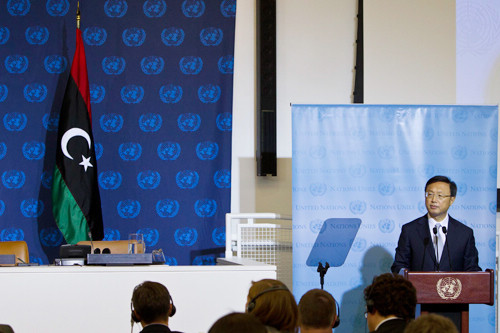|
 |
|
CHINA'S STANCE: Chinese Foreign Minister Yang Jiechi speaks at a high-level meeting on Libya at the UN headquarters in New York City on September 20 (ZHU WEI) |
Three weeks after the Libyan National Transitional Council (NTC) declared the end of the four-decade rule of Muammar Gaddafi, China recognized the NTC as Libya's legitimate government on September 12.
China was the last permanent member of the UN Security Council to recognize the NTC. Libya has now entered a new era, and China, like other world powers, will actively participate in the war-torn country's reconstruction.
"China stated that it respects the choice of the Libyan people, values the important status and role of the NTC, and has maintained close contact with it," said Chinese Foreign Ministry spokesman Ma Zhaoxu. "China recognizes the NTC as the ruling authority of Libya and the representative of the Libyan people and would like to work with it to push for the smooth transition and development of Sino-Libyan relations."
He said China hopes previously signed treaties and agreements between the two countries will remain valid and be earnestly implemented.
Major changes have taken place in Libya, and the country is now in a critical stage of reconstruction and transition. China raised no objection during the UN Security Council Libya Sanctions Committee's discussion of releasing the Libyan Government's assets in August, but only asked countries to provide more complete and clearer information on the usage and supervision of the assets, Ma said. China will continue to adopt a responsible and constructive attitude when dealing with similar issues in the future.
"We hope that an interim government will be formed at an early date to ensure peaceful and orderly transition of power," Ma said.
"Now is the perfect time to recognize the NTC, neither too early, nor too late," said Professor Li Zhaojie, who is an expert on international law studies at the Beijing-based Tsinghua University.
International law doesn't focus on how a new government gets power, whether through peaceful transition or through revolution or coup, he said. Instead, it focuses on whether or not this new government can become the country's legal representative in the world community. International law also looks at whether the new government can effectively govern, or whether the government effectively controls most of the country's territory and has the support of most of its citizens.
Li said since the NTC now basically controls the whole Libya and has won most Libyans' support, China should admit the new government in accordance with international law.
China is a responsible country abiding by principles, said Ma. China upholds a just position on the Libyan issue, making judgments and decisions based on the purposes and principles of the UN Charter, international law as well as the principles of non-interference in internal affairs and respect for the Libyan people's choice.
Li highlighted the responsible nature of China's recognition of the NTC. He said China must consider both its political relationship with Libya and international law when recognizing the NTC, avoiding premature or overdue recognition. If a country prematurely recognized a new government, it would be considered as intervening in the latter's internal affairs. If it recognized in the new government too late, it might be suspected of intervening in the latter's domestic affairs, too.
| 